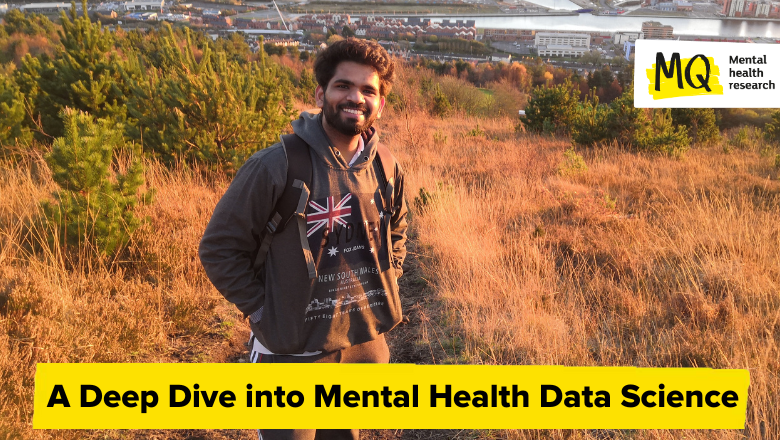Last month, the MQ and DATAMIND Data Science Meeting took place in Swansea.
The DATAMIND Hub expands the benefits of data by safely and securely combining data from multiple sources, such as health records, schools, administration, charities and more. Then, through the UK Health Data Research Innovation Gateway, researchers can discover the data and use it most effectively so that eventually we can together make the next breakthroughs in mental health science leading to a mentally healthier future for us all.
Harshal Lohakare (pictured above) is a passionate Mental Health Data Scientist who attended the event in Wales as well as the associated workshop the previous day. Here, he kindly shares what it was like to attend.
Day 1: Machine Learning in Mental Health Research workshop
For this two-day event students, researchers, clinicians, and industry people interested in mental health data science came together for an immersive and enlightening event. With a focus on leveraging data science techniques to understand and address mental health challenges, participants delved into machine learning workshops, guest speaker talks, perspectives from people with lived experience and captivating Early Career Researcher (ECR) presentations. Let’s take a journey through the highlights of this enriching event.
The MQ & DATAMINDS workshop began on a warm sunny day at Swansea University by a short welcome and introduction given by Professor Ann John to all the participants and a heartfelt tribute to Lea Milligan, MQ’s CEO who passed away following a sudden illness on Monday the 15th of April.
The event kicked off with a dynamic interactive workshop aimed at introducing participants to the fundamentals of machine learning in the context of mental health, led by Senior Lecturer Dr Marcos Del Pozo Baños. He took us on a step-by-step journey of how big machine learning models are created and explained each step in detailed and simple terms. Personally, having basic knowledge of machine learning this workshop helped me understand the big picture of machine learning modelling and particularly the maths happening behind it.
We learned about various machine learning algorithms and their applications in analysing mental health data. Through hands-on exercises and interactive discussions, we gained valuable insights into how machine learning can contribute to our understanding of mental health issues and inform evidence-based interventions. I would highly recommend it to someone who is trying to dip their toe into the world of machine learning and mental health, without having any prior knowledge of it.
Day 2: Guest Speaker Talks and Panel Discussions
The second day of the event was packed with inspiring talks from renowned guest speakers who are leading figures in the field of mental health data science. These experts shared their cutting-edge research findings, innovative methodologies, and practical implications for improving mental health outcomes using data-driven approaches.
They showed us the vast number of projects happening and about to start in the mental health data science field and the huge number of datasets available for cohort and longitudinal linkage and the datasets available and waiting to be explored. This also showed us the wide number of opportunities available to explore the field of severe mental illness, mental health inequalities and the use of administrative data in mental health research.
These presentations were followed by a panel discussion with all the speakers for social perspectives on Mental Health Data Science, which ignited a lot of engaging discussions in the room ranging from responsibility or researcher & policymakers, and effectively translating the research into policy making and not overstating the results of your research. Discussions regarding data privacy, public concerns about their data usage and providing transparency of how public data is being used for research and the impact it is generating.
Further, the importance of considering and implementing bio-psycho-social models in mental health data science research and other considerations while writing a grant proposal. One of the panel members for this discussion was a person with lived experience, he highlighted and provided insight into the gap which is present between researchers & people living with those mental conditions, and how important it is to bridge it.
Highlight: ECR Presentations
One of the highlights of the second day was the exceptional presentations by Early Career Researchers (ECRs) in mental health data science. These emerging scholars showcased their groundbreaking research projects, demonstrating creativity, rigour, and passion in addressing pressing mental health challenges.
The ECR presentations offered fresh perspectives and innovative solutions to complex problems, from novel data collection methods to linkage and advanced statistical analyses. Attendees were impressed by the depth of knowledge and the quality of research presented by these talented ECRs, highlighting the promising future of mental health data science.
Also, I had a thrilling opportunity to present my research poster titled “Self-harm contacts across healthcare settings in Wales: An e-cohort study using routinely collected linked healthcare data”. It was also encouraging to participate in vibrant discussions and receive valuable feedback.
Key Takeaways
- Participants gained foundational knowledge in machine learning techniques applicable to mental health research
- Guest speaker talks provided insights into cutting-edge research and practical mental health data science applications
- ECR presentations showcased the next generation of talent and innovation, inspiring collaboration and future research endeavours
The mental health data science event was a resounding success, bringing together researchers, practitioners, and enthusiasts to explore the intersection of data science and mental health. As we reflect on the insights gained and connections made during these two days, we are energized to continue our journey towards leveraging data science to improve mental health outcomes.
Thank you to Harshal Lohakare for sharing your insights.







